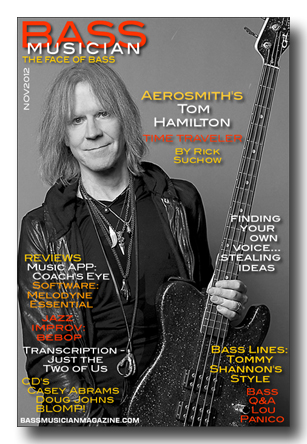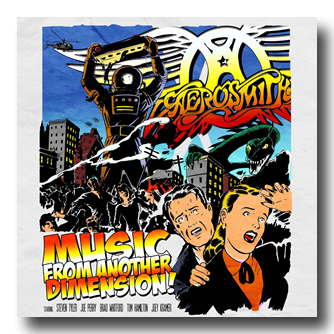Tom Hamilton: Time Traveler
by Rick Suchow
(This interview was published in the Novemeber 2012 issue of Bass Musician Magazine)
First things first. For those who might want to refer to Tom Hamilton as merely “the bass player from Aerosmith”, let’s refine the man’s credentials a bit. Here are the numbers: 150 million-plus records sold, including 25 gold, 18 platinum and 12 multi-platinum certifications, 21 Top 40 hits, 4 gold singles, and 27 massively successful tours. Add to that a wheelbarrow full of awards and an induction into the Rock and Roll Hall Of Fame. Where does that put Tom? Any way you slice it, Hamilton has to be regarded as one of the most successful American bassists in music history. Hell, maybe even the most.
While Steven Tyler and Joe Perry have received the lion’s share of the Aerosmith limelight over the years– for better or worse– Tom has navigated his career in the iconic band with a true bass player’s sensibility: he is the glue that keeps the parts together. And, after 40 years, they are still the original parts. While other legendary groups overstay their relevancy, or go through personnel changes that alter their musical personality, Aerosmith is a rare anomaly in rock and roll; not only are they the same five guys that formed the band back in Boston in 1971, but they are hotter than ever, as evidenced by their explosive new album that drops this week, Music From Another Dimension.
The fact that the album ever got made is somewhat of a feat in and of itself. The last five years have been a rocky road for the band, and for a while it seemed that there might never be another album, or even an Aerosmith for that matter. Drug abuse, infighting and health issues derailed them often, and when Steven Tyler signed on to be a judge on American Idol in 2010 it appeared that their days might be numbered. But they re-examined, re-focused, and re-energized. Music From Another Dimension is the result of that effort, and it is one of the best albums they’ve recorded.
At the heart of it all is Tom Hamilton’s agile bass playing, and it would be difficult to imagine Aerosmith’s sound without him. His bass lines cut with the bite of a shark, but a shark that hovers earth’s floor below. His playing is aggressive when necessary, sensitive when needed, and always providing the big bottom. Avoiding the petty squabbling and tabloid headlines that swirled around Tyler and Perry, it would take nothing short of a bout with throat cancer in 2006 to sideline Tom from his bandmates. Until then his presence was a given, a constant, and always there. But Hamilton battled back bravely, found a cure, and then jumped back in and helped the band create and follow through on the completion of its long awaited album.
Music From Another Dimension is a past-meets present-meets future affair for Aerosmith; they’ve reunited with producer Jack Douglas, who produced all of their early hit albums and most of this one. They wrote nearly all of the material on the new album, with Tom co-writing several songs, but also brought back a few outside writers who contributed to the band in their comeback era. Yet for all its retro-recapturing of early Aerosmith, the new album provides a powerful platform that catapults them into their next phase. For both Tom and the band, being back at full strength with the album and new tour is a hard-earned, triumphant return to the top of the charts.
I caught up with Tom last month as the band was preparing the release of the album, and he was quick to tell me he was grateful that there are still bass publications out there. I know that I am for sure; it gives me the opportunity to talk to guys like Tom Hamilton.
Listening to the new album, it’s obvious that you guys are still at the top of your game. And Jack Douglas is back as your producer, who of course produced all of your big albums from the 70′s. What makes him such a great producer for Aerosmith?
Well, he has the technical chops and the musical chops. But he’s also a great leader, and a really good coach, which is great for us because it can tend to minimize some of the competition within the band. There’s competition that’s great, because it keeps everybody trying hard, but sometimes we’ll get a little bit too deeply into it, so it’s good to have somebody that’s a moderator.
And not only that, but Jack can hear a weird, off the wall idea, and hear how it would become a good Aerosmith song, whereas a lot of producers might say, oh that doesn’t sound like something that would get on the radio, or there’s no lyrics to it, or something like that. And that’s a way of doing things that goes way back to Get Your Wings, which was the first album that we did with him. It’s his appreciation for anything that’s kind of interesting, and understanding how it can be developed into a cool song.
When you say competition within the band, are you talking about everybody getting their licks in and getting heard? What kind of competition?
Well, yeah, everybody comes into an album with a bunch of riffs, or even demos of fully written songs, and everybody wants to hear their ideas coming out of those two little pieces of skin in Steven’s throat. One thing that came about after our first big breakup in the late 70′s, was that when we got back together we knew we had to do something to jump start our creative process, so we opened up to the idea to using writers that were outside the band. So you had everybody in the band coming in with ideas, and also ideas coming from outside, so it got extremely competitive. And we got some great albums out of it.
I felt a little bit unfulfilled during a lot of those periods, because I’m just not a real assertive person as far as going in and getting everybody’s attention for a day, or whatever it takes to learn something that I’m working on. There was so much material, that I sort of started accumulating song ideas. In the past, that’s where the band would usually work up a track and then Steven would write a vocal to go with it, and I just realized that I had too much stuff to expect him to write vocals for it all, so I started doing it myself.
And I noticed you have a few writing credits on the new album.
You know, it’s just something that I decided to learn how to do. It’s been a great experience, and I’ve come to understand the challenge of writing good lyrics, because lyrics aren’t just poetic ideas and words. Lyrics are musical sounds, so they have to work on a lot of different levels that you might not expect. It’s been a really interesting learning process. And I also had to get my recording chops up to the point where I could make demos.
Is that how you guys usually do it, you demo it out and bring it in for everyone? What’s the general process?
A lot of times Joe and I will make demos of songs, and Brad will come in with just his head full of riffs, and the band will flesh it out.
Speaking of outside writers, I noticed that the song “We All Fall Down” on the new album was written by Diane Warren, who also wrote “I Don’t Want To Miss A Thing”, which turned out to be one of your biggest hits. What was your impression of “I Don’t Want To Miss A Thing” the first time you heard Diane’s demo of it? The song wasn’t really very Aerosmith sounding.
I was scared shitless. I heard the song, and I was like, we can’t do this. This is too embarrassing, I can’t handle this idea. [laughs] But, that was kind of my knee-jerk response. It worked.
It was a great thing for us because we got approached by the company that made the Armageddon movie, and they said, “Look, we’d like to use a bunch of your songs in our movie, and we’ve got one that Dianne Warren wrote, and we’re looking for a band to record it. Do you want to be that band?” So, by us agreeing to do it, we got a bunch of our classic rockers in the movie. And we worked with producer Matt Serletic on it, who was very good at understanding that the song had to sound like something that Aerosmith would play. So between us and him, I think we struck a balance.
I call songs like that our survival songs, you know, because it was during a period where a lot of radio stations weren’t playing Aerosmith anymore. As a matter of fact, a lot of the rock stations were advertising that they don’t play Aerosmith, or Rush, or “Stairway To Heaven”. So we found ourselves trying to re-ignite our career, you know, but without that traditional route of getting heard. So we went another route, and it kept us going.
The first single you released from the new album, “Legendary Child”, is a song the band started writing during the Get A Grip album (1993). What took so long to get it done?
Well, it goes back to the producer thing. Steven had a completed vocal on it, but we just didn’t have an advocate helping us to bring it home and make it the song that it could be, so that’s where Jack Douglas came in. He heard that song and said, wow that could make a great Aerosmith song. But let’s take it apart and re-write it, and get it so it’s really good. Which we did. We completely took it apart and rewrote it, Steven wrote a whole new set of lyrics for it, and we recorded a new version of it.
There are some interesting guest vocalists on the new album. Johnny Depp and Julian Lennon do backgrounds, and Carrie Underwood does a duet with Steven. How did Johnny wind up on it?
You know, I’m not sure. That probably came about while I was back east. He was a friend of someone that was working on the album, maybe it was Jack, I’m not really sure really exactly how that came about, but he would come down and hang out at the studio and just kind of listen to what was going on, and shoot the shit. Joe wrote that song, “Freedom Fighter”, and as happens a lot when it’s time to do gang backup vocals, anybody that’s hanging around the studio gets invited in to the room to get around the mic and sing.
The photo of you that your management sent me shows you holding a blue G&L bass. I know that you’ve got some Fenders and a bunch of Sadowskys as well. Which basses are you using on this album primarily?
Most of the songs were done with a Fender Jazz bass, one of their relics, where the custom shop makes a really nice bass and then they beat it up and kind of make it look old. But it’s funny, we were out on tour and it was our last gig, we were up in Vancouver. Steven and I were walking around and hanging out, and we went into a music store with a couple of other friends that were with us. One of them was a bass player, so he and I were drooling all over this Fender they had in a glass case. I got a look at the price tag and said, you know, forget that, and I went upstairs to look at the computer recording stuff. When I came down, Steven had his American Express card out and he bought it for me. And the damn thing turned out to have an amazing sound.
I’d say we did maybe three-quarters of the album with that bass, and then the rest with the G&L’s. I love Fender Jazz basses. I did all our big albums in the 70′s with an old, early 60′s stacked-pot Jazz bass, which I have right here in my office.
Would that be the one you used on “Sweet Emotion” by any chance?
Yep, I wrote that riff on this bass. I’ve always liked the Jazz Bass vibe, I love the really narrow neck and that particular sound.
You get a real nice top end out of that bass.
Yeah, there’s just a certain sound there, I don’t know how to describe it. And I found that the G&L’s gave me that sound, plus more. You know, it was Leo Fender’s idea of what that type of bass should sound like. So it makes sense that there’s continuity going from the classic Jazz Bass to the G&L.
Right. And which ones are you playing live with the band?
I’m using the G&L’s for most of the set. They made me one that was really awesome, and just kind of came over to the studio, dropped it off and said, you know, have at it, do with it what you will. And so we started to use it, but the damn thing was so heavy. I just kind of looked at it sideways and was like, my god, why does the bass have to be that heavy?
And then in between the east coast sessions and the west coast sessions, the band did some touring, and I told the company that I love the sound of this bass and I absolutely love the way it plays, but why does it have to be so heavy? And they said, well, we’ll tell you what, we’ll make you a couple of other ones. So they made me one out of pine, and another one out of ash, I think. But they routed it out, they took a lot of wood out of it, and it still sounded fantastic. So I love ‘em. And I’m still using my 5-string Sadowsky for the songs that I need a 5-string for. He just makes unbelievably nice basses.
The first time I had heard of bass makers routing out the wood was when Roger showed me a bunch of his chambered bass bodies in his shop years ago. It’s a great concept, and really helps with the weight.
It does, and it just makes it that much more fun to play.
Tell me about the title of the new album, Music From Another Dimension. What dimension are we talking about?
[Laughs]. It’s kind of that we feel such a connection to our early days working with Jack, it just created a vibe that was very familiar from those early 70′s records. I think it was Jack who suggested the idea of the title, and we were all like, yeah that’s ok, put it on the list. And the more we went on, we just felt the presence of our earlier selves coming out. It’s almost like these young punks from another dimension who came out to have their influence on the album.
I did notice the dinosaur on the cover. Who did the cover artwork by the way?
The artwork was done by Casey Tebo, who does most of our artwork and the video content for our website. He’s just an amazingly productive, creative guy.
Before we end, I just want to ask you how is your health, and how are you feeling, because I know you’ve had some issues in the past few years.
Well, you know I had cancer a couple of times, and so far so good. I had it in 2006, and then a recurrence in 2009, and I was very fortunate to be taken care of by a guy who was able to get rid of it without tearing my neck apart, so I’m very grateful for that. So everything’s good at the moment, thanks for asking. I feel good.
Rick Suchow: Bass
tom hamilton of aerosmith (november 2012)
Rick Suchow - Tom Hamilton - BMM
(Nov 1, 2012)



